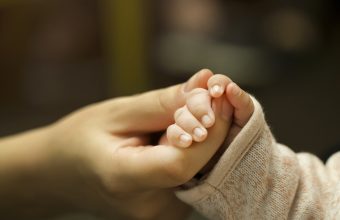My children are foster children. They’re legally “mine”, both adoptions were finalized years ago, but when I met them, they were foster kids.
Both my daughters came from challenging birth homes. Abuse, neglect, poverty and addiction are a common reality for children in care and mine were no different. Since becoming their mom, I’ve become attuned to the realities, myths and misconceptions that can prevent foster kids from finding their forever homes.
Many kids in care struggle with emotional, mental health and behavioural issues. Many of them struggle to trust and attach, which isn’t surprising given what many of them have experienced.
Poverty, neglect and a lack of proper nurturing and nutrition can have damaging effects on a developing brain. Through no fault of their own, these children are struggling to survive and thrive.
Canada’s national and provincial child welfare systems are underfunded, under-resourced and under-attended. There is no national tracking system to connect a waiting child in Alberta, for example, with a willing family in Ontario. It’s a running joke (though not a funny one), that our country keeps closer tabs on its used cars than its most vulnerable children.
Child welfare is a fluid and complex issue, to be sure. But that’s no excuse for a first-world country like ours. And until there’s public outcry and pressure on our elected officials, nothing will change for these kids. Our government has solved complex problems before. It’s tackled national issues and dealt with crises.
Why isn’t child welfare on anyone’s radar?
Having experienced the system first hand I believe people care, we just don’t care enough.
When Stephen Harper’s Conservative government launched a plan to end door-to-door mail delivery, the public outcry was substantial. One year later, Justin Trudeau’s Liberal party was elected on a promise to restore it. If we care that much about our mail service, surely we can rally around better treatment and services for our most vulnerable children?
Unfortunately, foster care and child welfare are not seen as a universal issue. Whereas mail delivery impacts us all, the care and keeping of at-risk youth does not. If I tell you tens of thousands of Canadian children are growing up in government care never knowing permanency, stability, security and love, of course you’ll care. You might even be outraged. But if it doesn’t impact you directly, it’s hard to get agitated enough to do something, especially when there are so many burning concerns deserving of our attention.
Add to that the perception that foster kids are “bad”, “damaged” and “unlovable” and we’re left with a climate of apathy and no one really knowing what to do or how to do it.
Truthfully, most crown wards (ie. kids who are adoptable because birth parent rights have been legally terminated) are older children or teenagers. Many of them have challenging behaviours, academic, emotional and/or mental health issues. Many are part of a sibling group. Many have changed foster homes several times, with no notice, leaving them angry, scared, frustrated and unable to trust and attach.
But they’re still children. Are older kids and teens less worthy of love, affection and permanency just because they’re not small and malleable? Growing up poor or disadvantaged should not make anyone less worthy of our concern. Being a sullen teenager who’s been separated from her siblings and lived in six different foster homes shouldn’t render her less worthy of our concern.
In fact, shouldn’t we work even harder to protect and care for those kids?
We can’t sweep these children’s challenges under the rug, and we can’t minimize them. They’re substantial. “Love cures all” is a nice thought, but it’s not always the case (though love is an excellent and essential first step.)
Children are resilient, but after a while resilience fades and is replaced by trauma. That is not to say these kids are beyond help, but rather to explain why many have deep hurts that manifest in negative behaviour.
Most of us believe these children are someone else’s responsibility. Ultimately, it’s our elected officials’ responsibility, but they aren’t getting the job done. So here we sit: with about 30,000 kids across our country waiting for forever homes and the problem doesn’t seem to be getting any better.
That’s 30,000 kids who didn’t celebrate Mother’s Day this weekend.
Doing nothing for these children shouldn’t be an option. Not everyone can adopt, but everyone can help.
May 14 is Children and Youth in Care Day. It was proclaimed into law in 2012 as a way to recognize the contributions former and current foster youths have made to our country, and to celebrate their strength, bravery and resilience in the face of adversity.
On May 14, write your MP or Tweet the Prime Minister. Ask your elected officials what they’re doing to fix Canada’s broken, fragmented and ineffective child welfare system. Ask them why a first-world country like ours can’t do better for its smallest, most vulnerable citizens. Tell them you’re a mother. Tell them you’re outraged. Tell them you expect them to do better.
I’ve written extensively on adoption-related topics, but I’ve never written about the kids who were left behind; the ones still in care, like my daughter’s half-brother who at age eleven lives in a clinical group home environment an hour away from the only people he knows because he hasn’t found a forever family.
I think we can do better for him and for all these children. But first, we need to care enough to take action.
As mothers, we are uniquely capable of speaking for the voiceless and advocating for children. Most of us don’t need a biological connection to feel strongly about protecting and nurturing kids. On May 14 and the days that follow you can use your voice to demand change.
Because if we don’t, who will?
Tagged under: adoption,adoption in canada,child welfare in canada,foster kids,foster care in Canada,Children and Youth in Care Day,caring about foster kids,child welfare,myths about foster care,myths about foster kids,mothers and foster care
Category: family-life,mom-101






